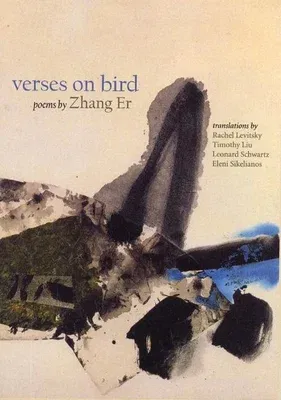... a highly developed range that's very beautiful.--Leslie Scalapino
Zhang Er grasps for the spiritual through objects of the mundane,
quietly detailing the wonder and desperation that courses through human
lives. In these poems, the eye watches the eye so that no facet of our
existence remains unexplored. Zhang Er belongs to the generation beyond
lament or anger over the hardship endured by Chinese intellectuals, from
overthrown rebellion to construction, from confusion to clarity, from
darkness to light (ambiguity to clarity). She walks out of suffering and
uncertainty, discovers the loveliness, preciousness of life and
self-respect . . .--(New World Poetry Bimonthly)
From the poem Verses on Bird:
The river is moving. The blackbird must be flying.
From classical fugues to Romanticism, this effort
produced
Schubert. When storms attack, the nightjar's cry
Swells. The noble revolution will require great
Sacrifice, yet do not ask me to capture this process on
the black
And white keys, nor to switch to another tone.
I could not find two birds with identical pitch.
With nothing to induce it, innocence makes me walk
Into rushing water as if I were brave. Empty space is great, but
nothing
Repeats itself there. Whether I do
Or whether I don't; from each, the sum of the piano's voice will rise.
Not to be doubted: bird writes poem, one vowel at a time.
Zhang Er was born in Beijing, China and moved to the United States in
1986. Her poetry, nonfiction and essays have appeared in publications
throughout the world, and she is the author of multiple books in Chinese
and in English translation. She has also participated in projects
sponsored by the New York Council for the Arts and by the Minetta Brook
Foundation.

